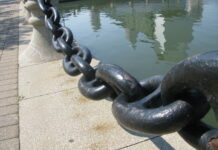Photo credit: DiasporaEngager (www.DiasporaEngager.com).
With demands that Israel leave Gaza’s Philadelphi Corridor and limit its operations in the West Bank, UN Secretary-General António Guterres has called on the Jewish State “to comply with its relevant obligations,” adding that “only an end to the occupation… will bring an end to the violence.”
Yet since 1993, Israel has complied with all its obligations.
Israel repeatedly conceded territory, but the only result was more terrorism and more attacks on its citizens — a fact that seems to have escaped the UN chief.
A decade after withdrawing from the Sinai Peninsula and dismantling settlements — which bought Israel durable peace with Egypt — the Jewish State tried, in 1993, to repeat the exercise with Yasser Arafat and the Palestine Liberation Organization (PLO).
Throughout the 1990s, however, Arafat upheld the Oslo Agreement only to force further concessions on Israel — all the while, plotting terrorism against it, and trying to destroy modern-day Israel.
Whenever Jerusalem balked, Arafat let Hamas’ violence obstruct peace, until he wrecked the whole process in 2000 by launching the Second Intifada.
Because negotiating peace with Arafat, Syria and Lebanon all failed, Israel opted to unilaterally concede territory, even without prior agreement.
In May 2000, Israel left Lebanon. In June of that year, the UN certified that Israel had met the requirements of Resolution 425, and expressed hope that this implementation “would be seen by all people of the region, especially Syrians, Palestinians and Israelis, as well as Lebanese, as an encouragement to quickly move ahead in negotiating peace treaties.”
But not so fast. Hezbollah thrashed the UN.
“We [liberated the land] not because of the UN that failed, over 22 years, in implementing Resolution 425,” said Hezbollah chief Hassan Nasrallah, in May 2000. Nasrallah called on the Palestinians to forget about the UN and its resolutions, and instead emulate his model.
“You can reclaim your land … and force the Zionist invaders to return from where they came from,” Nasrallah said. “The choice is yours and the model is before your eyes — serious resistance.”
Quiet on the Lebanese border with Israel did not last long. In July 2006, Hezbollah launched a major cross-border attack. A 33-day war ensued, and ended with Resolution 1701, which forced the Lebanese Armed Forces (LAF) and the 1978 UN Interim Force in Lebanon (UNIFIL) to do what Israel had requested in 2000 but never did: Deploy south of the River Litani to enforce UNSC 1701, including disbanding Hezbollah.
Yet with the LAF’s complicity and UNIFIL’s toothlessness, Hezbollah redeployed and rearmed all the way to the Lebanese border with Israel. Like Resolution 425 and Israel’s withdrawal from Lebanon, Resolution1701 did not make northern Israel safe.
Starting in 2022, Hezbollah intensified its harassment, this time demanding that Israel agree to allow Lebanon to explore the maritime border’s seabed for gas. In October, the Biden administration gave itself a pat on the back for helping reach “a historic” maritime border demarcation that would “advance security, stability, and prosperity for the region,” and that demonstrated “the transformative power of American diplomacy.”
A year later, on October 8, 2023, Hezbollah launched its war on Israel in support of Hamas, which had just murdered 1,200 people in southern Israel the day before. American diplomacy was not so transformative after all.
“Today, hope is greater than ever before that the liberation of Palestine, from the sea to the river,” will happen, Nasrallah said months before his October 8 war on Israel.
This time Nasrallah did not present his “armed resistance” as a model to the Palestinians, but declared his militia as a partner in the Iran-led “Axis of Resistance” that was fighting to “liberate Palestine,” a clear violation of Resolution 1701 and the Lebanese constitution.
In 2000, Israel did not foresee Nasrallah transforming his militia from defensive to offensive. Perhaps that was why, in 2005, Israel replicated its unilateral withdrawal from Lebanon by conceding Palestinian territories, even without prior agreement with the Palestinian Authority (PA) under Mahmud Abbas.
Israel dismantled settlements, pulled out 10,000 Israelis, and withdrew its forces from the Gaza Strip entirely and the northern part of the West Bank, around Jenin and Tulkarem.
Withdrawal was expected to boost the popularity of the PA, but its corruption and incompetence cost it the legislative election that Hamas won in 2006. By June 2007, Hamas had violently ejected the PA from Gaza. Palestinians now had two governments.
In the West Bank, under PA Prime Minister Salam Fayyad, the economy grew and security improved. Fayyad’s competence, however, deprived Abbas and his cronies of their public money spoils.
In 2013, Abbas ejected Fayyad, causing a backslide in the economy and security. Hamas started recruiting in Jenin, from where the terrorist group organized attacks — such as shootings, ramming cars, and knifings — against Israelis. The Israeli military was forced to operate in the West Bank, thus compounding Palestinian misery. When Abbas visited Jenin in July 2023, Palestinians chased him away.
Since October 2023, Israel has had to go into most of Gaza and intensified its incursions into the West Bank. Israel has also had to fight against Hezbollah to restore normalcy to its north.
Thirty-one years after Israel started experimenting with coordinated withdrawals with Palestinian leaders, 24 years after Israel unilaterally withdrew from Lebanon, 19 years after it left Gaza and Jenin, and only one year after Jerusalem signed on to a US-sponsored maritime border demarcation deal with Beirut, none of the deals or unilateral withdrawals brought Israel peace.
For its concessions, Israel got a Hamas massacre of 1,200 of its citizens on October 7, the biggest loss of Jewish life since the Holocaust. Then, on October 8, Israel found itself facing Hezbollah attacks that have depopulated its north.
And despite all of this, UN Secretary-General Guterres believes the end of Palestinian and Lebanese violence against Israel will only result from more Israeli withdrawals, as if three decades of Israeli concessions have not proven the futility of compromising — and that Jews, Israelis, and foreign citizens will die as a result.
Hussain Abdul-Hussain is a research fellow at the Foundation for the Defense of Democracy (FDD). Follow him on X @hahussain.
Source of original article: Hussain Abdul-Hussain / Opinion – Algemeiner.com (www.algemeiner.com).
The content of this article does not necessarily reflect the views or opinion of Global Diaspora News (www.GlobalDiasporaNews.com).
To submit your press release: (https://www.GlobalDiasporaNews.com/pr).
To advertise on Global Diaspora News: (www.GlobalDiasporaNews.com/ads).
Sign up to Global Diaspora News newsletter (https://www.GlobalDiasporaNews.com/newsletter/) to start receiving updates and opportunities directly in your email inbox for free.




























